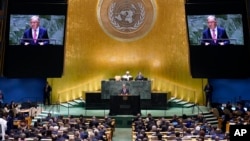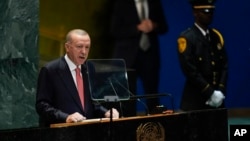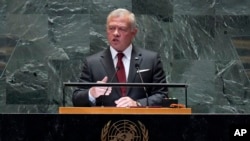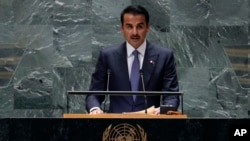The war in Gaza and its spread into Lebanon dominated the opening of the U.N. General Assembly's annual debate on Tuesday.
"Gaza is a nonstop nightmare that threatens to take the entire region with it," said U.N. Secretary-General Antonio Guterres. "Look no further than Lebanon. We should all be alarmed by the escalation. Lebanon is at the brink. The people of Lebanon – the people of Israel – and the people of the world – cannot afford Lebanon to become another Gaza."
He reiterated his call for a cease-fire in Gaza, one he has made since the war erupted following Hamas' October 7 terror attack in southern Israel.
"The international community must mobilize for an immediate cease-fire, the immediate and unconditional release of all hostages, and the beginning of an irreversible process towards a two-state solution," the U.N. chief said.
President Joe Biden, in his farewell address to the international community, also spoke of the war, saying both Israeli and Palestinian families are suffering and that the conflict must stop.
"They didn't ask for this war that Hamas started," Biden said. "I put forward with Qatar and Egypt a cease-fire and hostage deal. It has been endorsed by the U.N. Security Council. Now is the time for the parties to finalize its terms: bring the hostages home and secure security for Israel and Gaza, free of Hamas, ease the suffering in Gaza, and end this war."
Turkish President Recep Tayyip Erdogan, who is a vocal supporter of U.S.-designated terror group Hamas, gave an emotional and angry speech directed at Israel.
"And I would like to state very clearly and loudly here, the Israeli government is disregarding basic human rights, is trampling on international law at every opportunity, is practicing ethnic cleansing, a clear genocide against a nation, a people, and occupying their lands step-by-step," Erdogan said.
He called on the world to stop Prime Minister Benjamin Netanyahu.
"Seventy years ago, just as Hitler was stopped by an alliance of humanity, Netanyahu and his murder network must be stopped by an alliance of humanity," said the Turkish president.
Israel's U.N. ambassador accused Erdogan of spreading "pure hatred" against Israel.
"There are terrorists who kidnap citizens into tunnels in Gaza, there are terrorists who fire rockets from Lebanon, and there is Erdogan who comes every year to the U.N. and spreads pure hatred against the state of Israel," Danny Danon said.
Netanyahu is still expected to attend the General Assembly, despite the escalation. Danon told reporters he would arrive in New York on Thursday and address the UNGA Friday morning.
Jordan and Israel signed a peace agreement in 1994, but relations have been strained since the Gaza war erupted. More than 2 million Palestinian refugees live in Jordan, many since the 1948 Arab-Israeli war that led to the creation of Israel, and ties between the communities are strong.
Jordan's King Abdullah said the deaths of more than 41,000 Palestinians in the conflict is the result of consecutive Israeli governments being emboldened by years of impunity and rejecting peace in favor of confrontation.
"For decades, Israel has projected itself as a thriving Western-style democracy in the Middle East, but the brutality of the war on Gaza has forced the world to look closer," he said. "Now, many see Israel through the eyes of its victims, and the contradiction, the paradox, is too jarring."
Abdullah said humanitarian aid must not be used as a weapon of war, and he urged other nations to join Jordan in establishing what he called an international Gaza Humanitarian Gateway to speed aid to desperate Palestinians. The United Nations says 2.1 million Gazans are in urgent need of food assistance.
The king also made clear Jordan would never be an alternate homeland for Palestinians, as some over the years in Israel have suggested.
"So let me be very, very clear, that will never happen. We will never accept the forced displacement of Palestinians, which is a war crime," Abdullah said.
The emir of Qatar, who is involved in a mediation effort with the United States and Egypt to end the Gaza war, decried the situation there as a "genocide." Sheikh Tamim bin Hamad Al Thani said his government would continue to work toward securing a permanent cease-fire.
Criticism of Israel came from beyond its neighbors.
In December, South Africa filed a complaint at the U.N.'s top court, the International Court of Justice, seeking an order to prevent Israel committing a genocide against the Palestinians in Gaza.
The court said in a preliminary ruling that the risk of genocide was "plausible" but stopped short of ordering a cease-fire. The court said Israel should take steps to prevent a genocide, while it studied the issue further. Israel rejected the court's ruling and said it has a right to defend itself.
South Africa's president said they went to the court because they suffered under an apartheid regime.
"We lived through it. We suffered and died under it. We will not remain silent and watch as apartheid is perpetrated against others," Cyril Ramaphosa said.
"In Gaza and the West Bank, we are witnessing one of the greatest humanitarian crises in recent history, which is now spreading dangerously to Lebanon," said the day's first speaker, Brazilian President Luiz Inácio Lula da Silva. "What began as a terrorist action by fanatics against innocent Israeli civilians has become a collective punishment for the entire Palestinian people."
Iran's new president, Masoud Pezeshkian, predictably struck out at Israel. But he also had a message for the West, saying he is ready to reengage in nuclear talks and would like unilateral sanctions lifted.
"In order to build a better future world, Iran stands prepared to foster meaningful economic, social, political and security partnerships with global powers and its neighbors based on equal footing," Pezeshkian said. "The appropriate response to this message from Iran is not to impose more sanctions but to fulfill existing obligations to remove sanctions benefiting the Iranian people, hence laying the foundations for more constructive agreements."
Ukraine
While Gaza was in the spotlight in the General Assembly, Ukraine was the subject of a high-level meeting Tuesday afternoon in the U.N. Security Council.
“[Russian President Vladimir] Putin has broken so many international norms and rules that he won't stop on his own, Russia can only be forced into peace, and that is exactly what's needed,” Ukraine’s President Volodymyr Zelenskyy told the 15-nation council. “Forcing Russia into peace as the sole aggressor in this war. The sole violator of the U.N. Charter.”
He accused Moscow of trying to destroy Ukraine’s energy system ahead of winter.
“They are preparing to target our nuclear power plants, three of them. We have this information, and we have proof of this,” Zelenskyy said, without going into further detail.
U.S. Secretary of State Antony Blinken urged nations to support Ukraine, saying it is fighting for its survival.
“If countries stopped supporting Russia, Putin’s invasion would soon come to an end,” he said. “If countries stopped supporting Ukraine, Ukraine could soon come to an end.”
Russia's envoy dismissed Blinken's fears for Ukraine.
"It's not threatened with anything. We are not fighting against it," Ambassador Vassily Nebenzia said of Ukraine. "We are fighting against a criminal regime which seized power in Kyiv and is bringing its people towards catastrophe. And this is not a war for territory, regardless of the claims of our foes. This is a struggle for acknowledgment of people's rights."
On Wednesday, Zelenskyy will make his case to the entire international community when he addresses the General Assembly.
Of the 194 speakers this week, among them 76 heads of state and 42 prime ministers, 19 are women. U.N. chief Guterres said that is “unacceptable” and called for greater gender equity.
VOA’s Chris Hannas contributed to this report.









